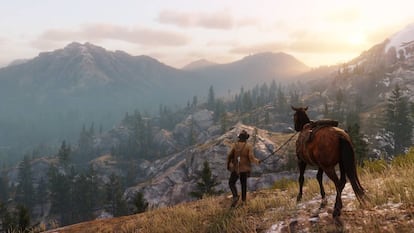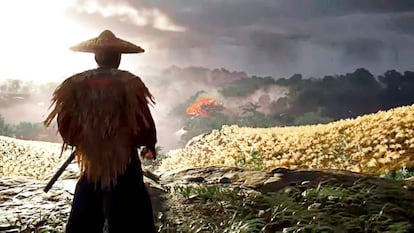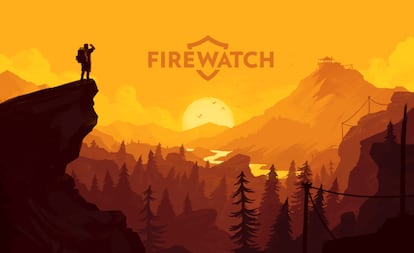Slow gaming: How video games are swapping nerve-racking battles for relaxing walks
In a world of stress, people are turning to their consoles for solace and escape in the form of contemplative, peaceful adventure

The year was 2008, and a small production company decided to take a popular first-person shooter video game and remove all the shooting. Instead, its modified version of Half-Life 2 offered the soliloquy of a man as he told his story to the player. The original version was about walking, dodging and killing; the alternate, just about walking and listening. Many users sarcastically remarked that a new genre had been created: the walking simulator. Time, however, has turned the joke into something quite serious.
Today, walking simulators are a genre in their own right, and Dear Esther (which started as a Half-Life 2 mod and ended up with an official version released in 2012) is one of the great examples of the genre. “The term originated as a derogatory way to make fun of those hipster games where you don’t shoot, but it caught on,” explains Jordi de Paco, a video game developer at the production company Deconstructeam. De Paco is aware of the importance of walking: so much so, that he co-hosts a podcast about creativity and gaming, called Andar (To Walk), which is recorded in the street as he and his co-host, Marina González, go for a walk. “On walks, very interesting conversations tend to surface, ideas that would never emerge sitting at a table,” he explains.

This idea is as valid in the digital realm as it is in the physical world. Games like Gone Home, What Remains of Edith Finch, Everybody’s Gone to the Rapture and Firewatch are proof of this, and their success has helped establish the genre. These video games offer walks through the woods, a deserted village or somebody’s parents’ house; they turn the player into a digital wanderer and have also help popularized other types of games that, even without truly qualifying as walking simulators, opt for a slower rhythm. And that is what is known as slow gaming. The slow movement – usually linked to eating, meditating and drinking – has come to your console.
One game, Unpacking, is about literally unpacking your things from moving boxes and finding a place for them in a new house. Another one, called Walden, a game, tries to follow in the footsteps of American philosopher Henry David Thoreau, author of the classic novel Walden, in his retirement to the countryside. The Red Strings Club presents a bartender who spends his time creating cocktails and chatting with his customers. De Paco was the director of the latter, an indie hit that has shipped more than 300,000 units. “People who see video games as jumping and shooting will be difficult to entice,” he says, “but those who like literature, movies and series are very likely to be able to connect with an interactive story, be it in the form of a walking simulator or a conversational adventure.”
There is yet another reason behind the success of slow, enjoyable games: the social context. When your work and social routines become a battle, you might not feel like waging another one when you turn on the console. As journalist Jorge Morla argued recently, horror and action are two genres in which video games surpass all other forms of expression; the need for total immersion (you cannot ignore it while you check your phone, like you would do with a series) causes more tension in the player. But one is not always looking for such intensity. Sometimes, after a hard day at work, you feel like disconnecting and spending some time in a world that is more pleasant than the real one. Suffice it to say that, during the Covid-19 confinement – the most stressful time in recent memory – everybody found solace in the very slow, very social and very cute Animal Crossing.
“I think that gamers have grown tired of the usual kill or flee game,” explains Sofía Francisco, author of the essay Walking Simulators: la exploración hecha videojuego (Walking Simulators: Exploration Made Into a Video Game). “What’s more, with the current trends of mental health care, many of these games provide an escape that’s more necessary than ever.” Compared to the stress and adrenaline of playing a classic game in which the speed of your reflexes and the skill of your fingers determine if you live or die, slow gaming offers a much calmer, serene gratification. “Since there is usually no possibility of dying, they are very peaceful games that leave you to your own devices, without the need to stress yourself out,” she explains.

A decade after the small producers proved that these types of games work, the big ones have decided to move in on slow gaming. “Once a game like Dear Esther hits the nail on the head, the big companies can jump on the bandwagon and replicate the formulas with a much bigger budget,” explains De Paco. This includes adventure games in which contemplative walks are very important for the plot, such as Ghost of Tsushima, Red Dead Redemption 2 and Spider-Man. In them, walking (or riding, or swinging from spider webs) becomes part of the playable experience, making the games more enjoyable and reflective. Even the big action titles have added a slow component, and the popular open world games, with their increasingly larger maps and realistic worlds, have also helped.
Death Stranding – whose sequel has already been announced – was the first big-budget walking simulator. Although it also used other mechanics, it provided hours (perhaps too many) of wandering. A science fiction adventure thus became a simulator to see the sights around a post-apocalyptic steppe, paving the way to including landscape, walk and reflection as part of the gaming experience.

Sign up for our weekly newsletter to get more English-language news coverage from EL PAÍS USA Edition
Tu suscripción se está usando en otro dispositivo
¿Quieres añadir otro usuario a tu suscripción?
Si continúas leyendo en este dispositivo, no se podrá leer en el otro.
FlechaTu suscripción se está usando en otro dispositivo y solo puedes acceder a EL PAÍS desde un dispositivo a la vez.
Si quieres compartir tu cuenta, cambia tu suscripción a la modalidad Premium, así podrás añadir otro usuario. Cada uno accederá con su propia cuenta de email, lo que os permitirá personalizar vuestra experiencia en EL PAÍS.
¿Tienes una suscripción de empresa? Accede aquí para contratar más cuentas.
En el caso de no saber quién está usando tu cuenta, te recomendamos cambiar tu contraseña aquí.
Si decides continuar compartiendo tu cuenta, este mensaje se mostrará en tu dispositivo y en el de la otra persona que está usando tu cuenta de forma indefinida, afectando a tu experiencia de lectura. Puedes consultar aquí los términos y condiciones de la suscripción digital.









































